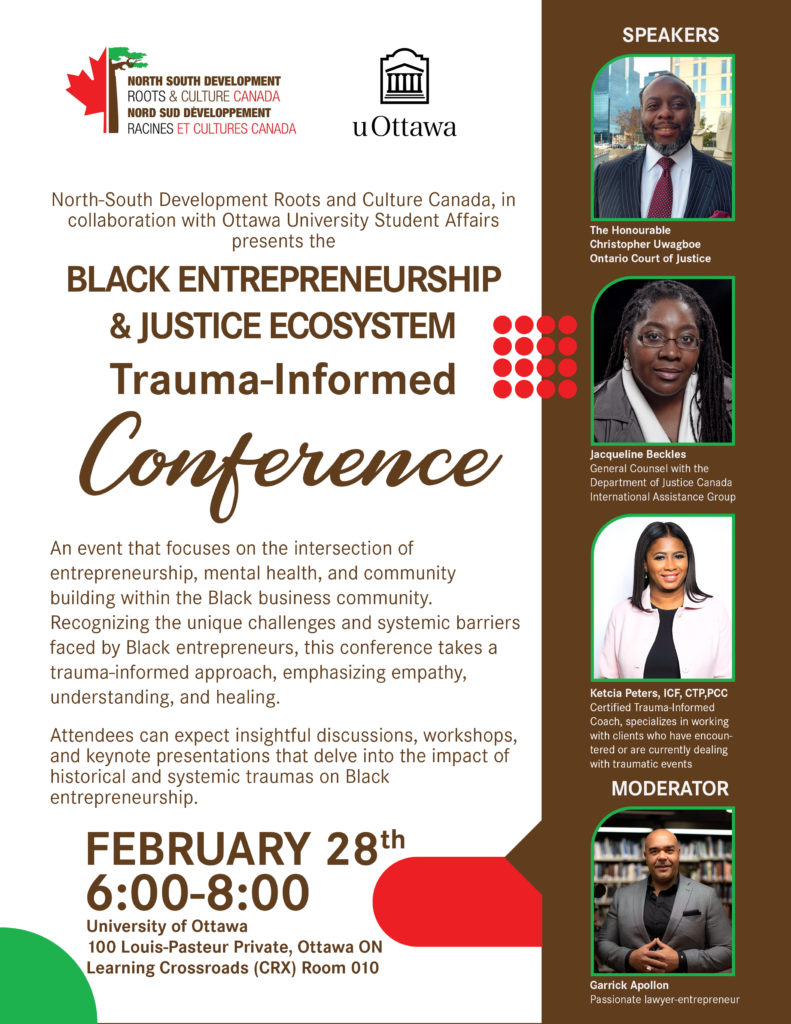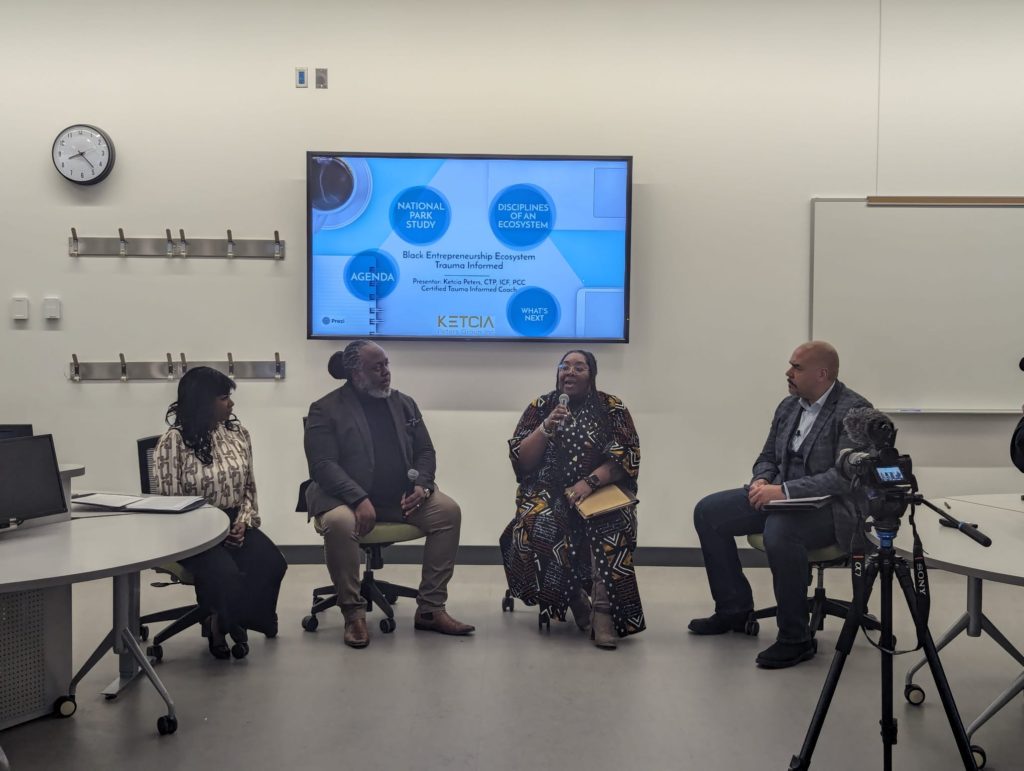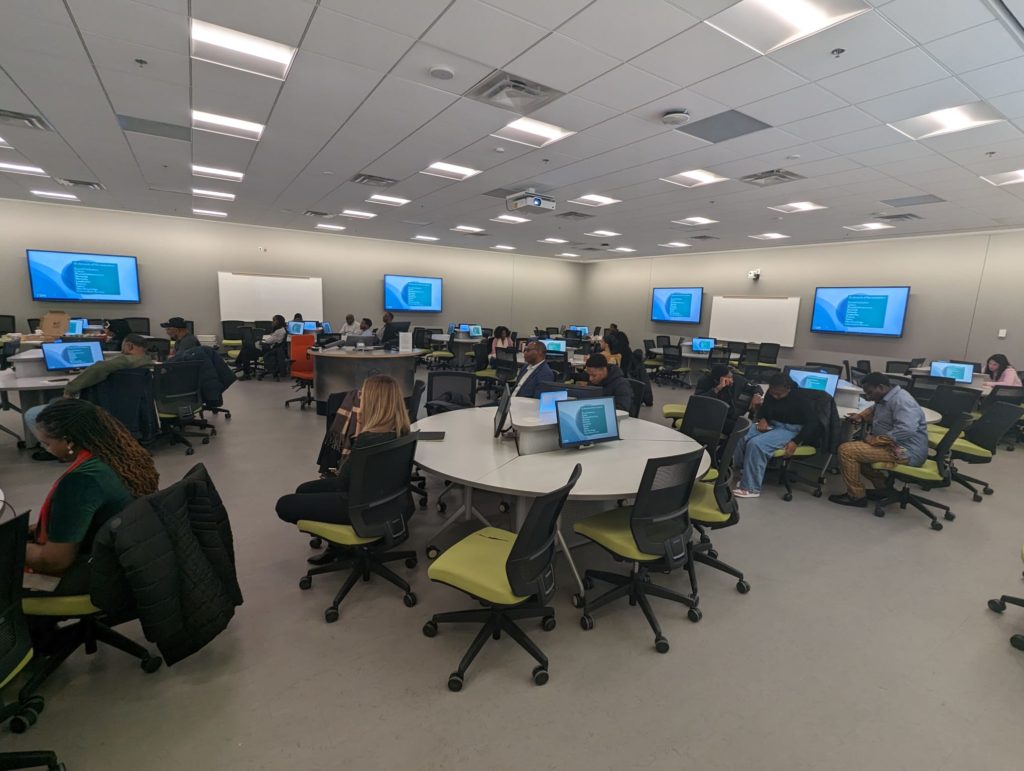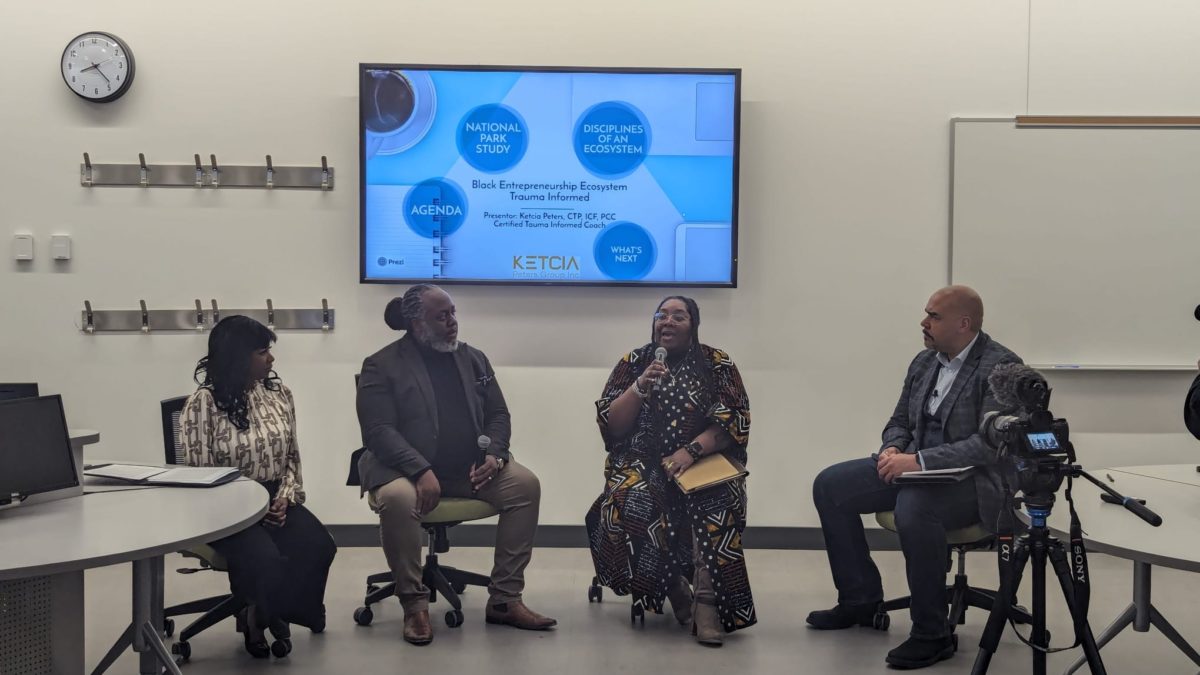
Wednesday 28 February 2024
North-South Development Roots and Culture Canada in collaboration with Ottawa University Student Affairs presented the Black Entrepreneurship & Justice Ecosystem Trauma-Informed Conference
by Ketcia Peters

The Black Entrepreneurship Ecosystem Trauma-Informed Conference is a transformative event that focuses on the intersection of entrepreneurship, mental health, and community building within the Black business community. Recognizing the unique challenges and systemic barriers faced by Black entrepreneurs, this conference takes a trauma-informed approach, emphasizing empathy, understanding, and healing.
Attendees can expect insightful discussions, workshops, and keynote presentations that delve into the impact of historical and systemic traumas on Black entrepreneurship. The conference aims to create a supportive and inclusive space where participants can share experiences, learn coping mechanisms, and explore strategies for building resilient businesses. Through a lens of trauma-informed care, the conference empowers Black entrepreneurs to navigate the complexities of the business world while addressing the emotional and psychological aspects of their journey. This event serves as a vital platform for fostering a more equitable and compassionate entrepreneurial ecosystem.

Below is a summary of the responses from the panel discussion from this conference.
- Panel Questions –
Black Entrepreneurship & Justice Ecosystem Trauma-Informed conference
- Could you share your perspective on how you’ve incorporated and prioritized your Black identity throughout your career? The panel provided individual responses to this question.
- How does the intersection of trauma and black entrepreneurship impact the experiences and outcomes of individuals within the black entrepreneurial community?
The intersection of trauma and Black entrepreneurship profoundly impacts individuals within the Black entrepreneurial community by influencing their experiences and outcomes in various ways. Trauma can create significant barriers to success, affecting mental health, decision-making, access to resources, and resilience. Entrepreneurs who have experienced trauma may struggle with confidence, trust issues, and difficulties in building and sustaining relationships, which are essential for business growth. Moreover, systemic inequalities and discrimination further exacerbate these challenges, limiting opportunities for Black entrepreneurs to thrive.
- In your view, what is the impact of intergenerational trauma within the Black community?
Intergenerational trauma within the Black community has a profound and enduring impact on individuals’ mental, emotional, and physical well-being. It stems from historical experiences of slavery, oppression, segregation, and systemic racism, which have been passed down through generations. This trauma manifests in various ways, including feelings of fear, anger, and mistrust, as well as challenges in forming healthy relationships and achieving socio-economic success. Addressing intergenerational trauma is crucial for healing and empowering future generations to break the cycle of adversity.
- How much do you believe trauma contributes to the economic disparities within the Black community?
Trauma contributes significantly to economic disparities within the Black community. Historical injustices, such as slavery, segregation, and institutionalized racism, have created systemic barriers that hinder Black individuals’ access to education, employment, housing, and financial resources. Moreover, traumatic experiences, such as violence, discrimination, and poverty, can have long-term effects on mental health and economic stability, further perpetuating disparities. Addressing trauma is essential for dismantling these systemic inequalities and creating equitable opportunities for economic advancement.
- In your opinion, how crucial is it to address trauma within the Black entrepreneurial community?
Addressing trauma within the Black entrepreneurial community is critically important for fostering holistic well-being and sustainable business success. Trauma-informed approaches recognize the impact of trauma on individuals’ lives and provide support and resources to promote healing and resilience. By creating safe and supportive environments that acknowledge and address trauma, Black entrepreneurs can enhance their mental health, decision-making, and interpersonal relationships, leading to improved business outcomes and community empowerment.
- Considering the tendency to conform to Eurocentric standards of professionalism, such as attire, hair, and speech, how has this mindset influenced the response to trauma within the Black community?
The tendency to conform to Eurocentric standards of professionalism, including attire, hair, and speech, has influenced the response to trauma within the Black community by perpetuating feelings of inferiority, self-doubt, and cultural assimilation. Eurocentric norms often marginalize and invalidate Black cultural identities and expressions, leading to internalized racism and shame. This can exacerbate trauma symptoms and hinder healing efforts, as individuals may feel pressure to conform to dominant standards rather than embracing their authentic selves. Recognizing and challenging these norms is essential for promoting healing and empowering Black individuals to reclaim their identities and narratives.
- Regarding the role of forgiveness in the healing process, where do you personally stand on the journey of racial healing?
Forgiveness plays a complex and deeply personal role in the journey of racial healing. As a Black individual, I understand the significance of acknowledging and processing feelings of anger, pain, and injustice caused by historical and systemic racism. While forgiveness can be a powerful tool for releasing resentment and promoting emotional well-being, it should not be conflated with forgetting or condoning oppression. True healing requires systemic change, accountability, and reparative justice, alongside individual acts of forgiveness. Personally, I believe in the importance of forgiveness as part of a broader process of healing and liberation, but it must be approached with sensitivity to each person’s unique experiences and boundaries.
- What are your thoughts on the idea of Black individuals letting go of resentment for historical injustices?
The idea of Black individuals letting go of resentment for historical injustices is complex and multifaceted. While forgiveness can be a transformative and empowering act, it should not be imposed or expected as a requirement for healing. Historical traumas and systemic injustices continue to have profound and lasting effects on individuals and communities, and it is essential to acknowledge and address these legacies with compassion and accountability. Encouraging forgiveness without addressing the root causes of injustice can perpetuate harm and undermine efforts for systemic change. Ultimately, the decision to forgive is deeply personal and should be respected as part of each individual’s healing journey.
- How would you envision a Trauma-Informed Black entrepreneurship and Justice ecosystem?
A Trauma-Informed Black entrepreneurship and Justice ecosystem would prioritize creating safe, supportive, and inclusive spaces that recognize and address the impact of trauma on individuals and communities. This ecosystem would integrate trauma-informed practices into all aspects of entrepreneurship, including business development, education, mentorship, and access to resources. Key components would include culturally responsive mental health support, trauma-informed training and education, equitable access to funding and opportunities, and community-led initiatives for healing and empowerment. By centering the experiences and needs of Black entrepreneurs and addressing systemic barriers to success, this ecosystem would foster resilience, innovation, and collective well-being.
- Regarding Dr. Gabor Matte’s statement about the legal profession, that many individuals in jail and our justice system are traumatized, what are your reflections on this assertion?
Dr. Gabor Mate’s assertion about the legal profession highlights the pervasive impact of trauma on individuals involved in the justice system. Many individuals who come into contact with the legal system, including those who are incarcerated, have experienced significant trauma throughout their lives, including poverty, violence, abuse, and systemic racism. Trauma can influence behavior, decision-making, and coping mechanisms, contributing to involvement in criminal activities and cycles of incarceration. Recognizing and addressing trauma within the legal system is essential for promoting healing, rehabilitation, and justice. Trauma-informed approaches that prioritize empathy, understanding, and support can help break the cycle of trauma and incarceration, leading to better outcomes for individuals and communities.
- In the ongoing public discourse surrounding systemic racism, where do you find hope?
In the ongoing public discourse surrounding systemic racism, hope can be found in the resilience, activism, and solidarity of individuals and communities working towards justice and equality. Despite the persistence of systemic inequalities and injustices, there is growing awareness and mobilization to challenge and dismantle oppressive structures and institutions. Hope lies in the voices of those advocating for change, the progress being made in addressing racial disparities, and the collective efforts to build a more equitable and inclusive society. By continuing to amplify marginalized voices, centering the experiences of those most affected by racism, and taking meaningful action to address systemic inequities, we can create a future where all individuals are valued, respected, and empowered to thrive.
Thank you…for your contribution tonight!

